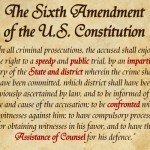ILLINOIS FELONY FACT SHEET Felony Defined: A serious crime that has a possible prison term of 1 year or more. Some felonies carry terms of up to 60 years. Murder is a felony, but has special rules of its own, including life in prison or execution. THE FELONY PROCESS IN ILLINOIS The Arrest: When the police […]
ILLINOIS DOMESTIC BATTERY FACT SHEET
ILLINOIS DOMESTIC BATTERY FACT SHEET Domestic Battery: A case of battery involving family members. Family members include people related by blood or marriage, that share a home, that have or had a dating relationship, or that have a child in common. Domestic Battery is a Class A misdemeanor. The possible penalties are up to a year […]
Fourth Amendment Probable Cause for a Warrantless Arrest
A police officer cannot arrest a citizen without a warrant based upon a hunch or mere suspicion. He must have “probable cause”. The US Constitution‘s Fourth Amendment[1] requires a warrant for a person or his property to be “seized” or searched by a government agent. The law has developed allowing government agents to conduct warrantless […]
The Sixth Amendment, One Amendment, Six Constitutional Rights
The Sixth Amendment contains rights beyond the well-known right to an attorney in criminal matters. There are six constitutional rights in the Sixth Amendment. They are procedural rights designed to protect an individual’s inalienable natural rights of life and liberty found in the Declaration of Independence. The Sixth Amendment is part of the Bill of Rights, […]
Expunging & Sealing Florida Criminal Records
It is difficult to get a job in today’s economy, especially for an individual with a criminal record. For those with a criminal history in Florida[1] there is a process for some individuals to clean their records. For eligible individuals there are 2 potential outcomes for clearing a Florida criminal history. One is for the […]
The Fifth Amendment’s Grand Jury: A Proud & Lost Protection of Liberty
The Fifth Amendment of the Bill of Rights mandates government procedures to protect the natural, inalienable rights of life, liberty and the pursuit of happiness recognized in the Declaration of Independence. The amendment contains five protections for these natural rights. The Fifth Amendment’s first protection requires the federal government to use a grand jury to […]
The Fifth Amendment: Procedural Protections for Natural Rights
The First United States Congress proposed 12 amendments to the Constitution in 1789. The states ratified ten of the proposed amendments: The Bill of Rights. The Fifth Amendment contains five procedural rights. If the government seeks to take someone’s life, liberty or property it must follow the Fifth Amendment’s rules. The Fifth Amendment “No person […]
Interstate Extradition in the United States
Every State of the United States has legal authority regarding people present within its boundaries. A State does not have authority over a person present in another State. For example: If a person is wanted for a crime committed in Illinois is found in Florida, an arrest can only legally be made by Florida law […]
Entrapment as an Affirmative Defense to Criminal Charges
“Entrapment” may be a defense to criminal prosecution if a government agent induced a person to commit a crime which the person was otherwise unlikely to commit. Investigation and prosecution of certain crimes can be difficult unless members or agents of law enforcement participate in elements of the prohibited activity. Examples are drug sales, prostitution […]
Direct vs. Circumstantial Evidence: Observation vs. Inference
There are two types of evidence at a trial: direct and circumstantial. One, if believed, directly proves a fact; the other allows a fact to be inferred. In court a trial is held to determine specific facts and the legal implications of those facts. In a criminal trial, the question is if the defendant broke […]













